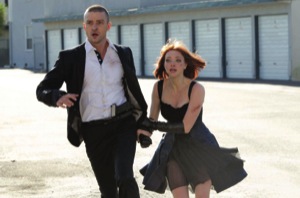
I didn’t plan it this way, but for the second week in a row I’m reviewing a movie that is oddly in tune with the Occupy Wall Street zeitgeist. While Margin Call, which I wrote about last week, is actually about Wall Street, In Time has a slightly more oblique connection; it uses a science fictional story about immortality as metaphor for the exploitation of the poor. Andrew Niccol, who so brilliantly dramatized the fear of genetic engineering in Gattaca and the pitfalls of reality TV in The Truman Show, goes the whole hog in In Time, creating what can only be called a Marxist parable that was probably sold to some board room as “Logan’s Run crossed with Robin Hood.” Unfortunately, In Time is only great in its ideas; it’s a conceit in search of a movie.
In the future or in some parallel universe, humans have been genetically engineered to stop aging at 25. They then have only one year left to live after their 25th birthday, unless they can earn more time, which has replaced money as the currency around which the world’s economy revolves. Their time is displayed in a digital readout on their left arms; transfers are made with special handshakes. Everyone looks young and beautiful, but the rich are basically immortal and the poor die quickly.
Justin Timberlake is Will Salas, one of the poor workers, who saves a very rich man named Henry Hamilton (Matt Bomer) from time thieves called Minutemen. Though Henry wanted to be killed – to have his time sucked from him – he decides Will is worthy, and he gives him the rest of his time, more than 100 years, and kills himself. Or, he “times out;” one of the many puns that get a bit oppressive after about five minutes. Before Henry dies, he tells Will that the system is rigged; that prices and taxes rise when there are too many poor people, ensuring their deaths so that there is always more time (and space) for the super rich. In case the metaphor isn’t clear, that’s how capitalism works; for winners to exist, losers have to lose. By making the story about life and death, instead of about cash, Niccol ramps up the stakes to infinity.
When Will is unable to give his mother (Olivia Wilde) any time before she dies in his arms, he sets out to take revenge. He pays his way out of the Los Angeles ghetto known as Dayton and into the gated community of the rich known as New Greenwich. There, he meets the richest people in the world, earns more time in a card game, and falls for a beautiful, petulant heiress named Sylvia (Amanda Seyfried). But the cops, known as Timekeepers, are convinced that Will murdered Henry for his time, and when they come to arrest Will, all hell breaks loose. The rest of the movie follows Will and Sylvia as they run from the Timekeepers, led by a bored Cillian Murphy; and the Minutemen, led by badly cast Alex Pettyfer, and try to redistribute time pretty much exactly as Robin of Locksley would have.
Niccol’s crew includes some of the greatest alive – cinematographer Roger Deakins (Shawshank Redemption, No Country for Old Men), costume designer Colleen Atwood (Chicago, most of Tim Burton’s movies), and production designer Alex McDowell (Fight Club, Watchmen) – and his cast is about as beautiful as they come. It’s hard to tell whether Timberlake is hotter shirtless or in one of Atwood’s perfectly fitting suits; Seyfried is as slinky and stunning as she’s ever been and Pettyfer, Murphy and Wilde round out the gorgeousness. But the visuals cannot hide the cliché-ridden, almost bizarrely lifeless dialogue; nor the acting and action that are as tense as wet toilet paper. It seems that Niccol thinks he’s making something as high-brow as Minority Report or Bonnie & Clyde, but it’s really just a mediocre Twilight Zone episode with incredible production values.










